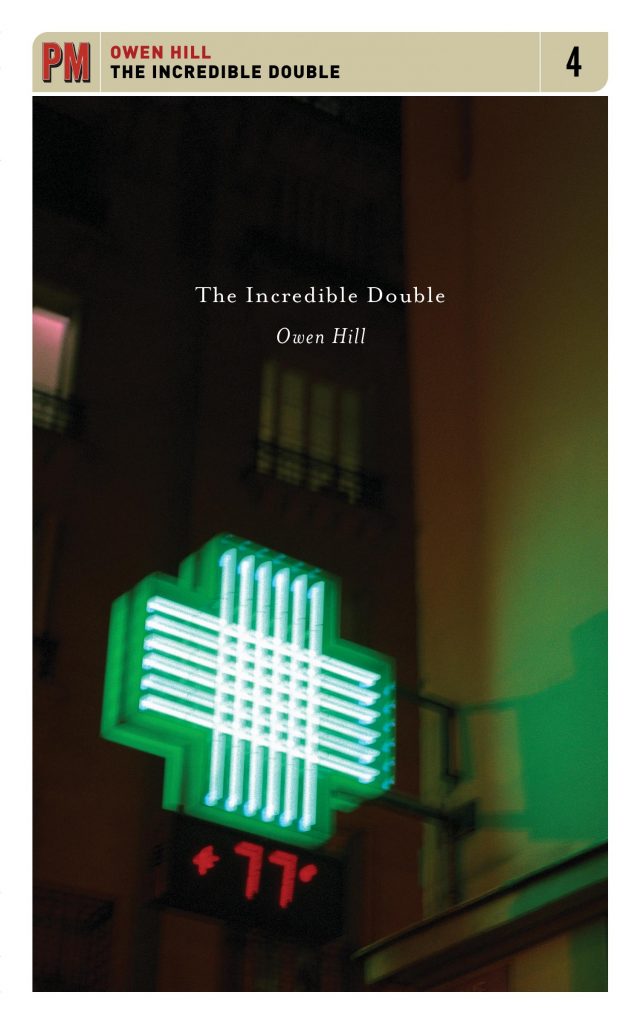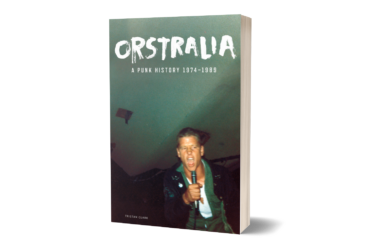By Kevin O’Neill
Mary Magazine
January 2010
Owen Hill’s novel The Incredible Double features Clay Blackburn, a book-scout by day, moonlighting as an unlicensed private eye. When a big chain store tries to set up shop in the community, Blackburn is pulled into a murder mystery and thrust into contact with a diverse cast of quirky contacts, all with their own stake in the political landscape of Blackburn’s hometown, Berkeley, California. The Incredible Double is full of humor, but also manages to highlight stark and uncomfortable realities. Hill is concerned with giving his reader a spectrum of experience—from distraction and sheer pleasure, to absurd but cutting satire—all in the service of a compelling mystery, because at its heart, that is what The Incredible Double is: a well told mystery. As for the novel’s humor, Hill says his taste for satire comes from a desire to “hold up the mirror” to the world he sees each day as a Berkeley-based poet and novelist. Appropriately, Owen and I met at a coffee house fifty feet from Berkeley’s border. Sitting outside, amidst foot traffic and exhaust from passing cars, we talked about his approach to fiction and poetry, his most recent novel, and his belief in the left’s need for a Clint Eastwood type.
KO: Clay Blackburn, the protagonist from The Chandler Apartments and your most recent novel The Incredible Double, is a bisexual poet/book scout/private eye, hired by a drugstore kingpin to scout the underbelly of Berkeley, California. When did you first start thinking of writing about Clay, and how were you inspired to take on this project?
OH: Well, I live in an apartment building called the Chandler apartments, so it became kind of a dare. People said, you know, you should write a mystery. So, it sort of came out of that, and the neighborhood, which is sometimes daunting, but interesting. And, I sort of backed into this ridiculously cheap, rent-controlled apartment and had to make the best of it. So, I started to romanticize it. There are a lot of crime novels that are possible in that neighborhood.
KO: Really?
OH: Yeah, too many maybe. So, it was definitely inspired by the neighborhood.
KO: As you mentioned, The Incredible Double takes the form of the mystery novel. But in some ways this book subverts the expectations of that genre. The tone is light at parts, the novel’s often very funny. There is even a small jab at Paul Auster in there…
OH: Yeah, I hope he knows I am doing it with respect, having read most of his books. I come out of the poetry community. I’ve been a poet, I’ve run a reading series for years, I did a magazine. So, using those characters, and making fun of that in these books sort of came naturally. I knew the territory.
KO: And, potentially one reason why the mystery genre is so suited for this project is that the novel is a very fun read, and compels you toward the answer, even if the journey is an unexpected deviation from a popular contemporary mystery. But, it’s such a good story, that you just want to know what will happen next. I think sometimes “spinning a good yarn,” or putting down an interesting story, is as important as any other aim you have for a work of fiction.
OH: Well, I think, especially for this type of novel. It’s the engine. It keeps you going, it keeps you reading. And, if I can construct a plot that isn’t too ridiculous, or is only somewhat ridiculous, having the reader hooked by the story allows me to spin off and do all this other stuff. So, it’s a little like form in poetry. You find a form, and you use it, but you’re really saying something way outside of that form, possibly.
KO: It gives you a skeleton to flesh out. It’s funny how structure can be freeing sometimes. People often think of structure as confining.
OH: Yeah.
KO: Well, something I kept thinking about with your work is the concept of “place.” People always talk about place in literature, how important it is or isn’t in a given work. Some novels, for example, could take place anywhere. You take the same characters and situation and put them in France or Japan, and it’s the same thing. It’s not that way with The Incredible Double. I feel like it’s just as much about the place of Berkeley, as it as about anything else.
OH: Sure. Genre writing, especially the mystery genre, the sense of place is such an important part. I was with somebody trying to come up with something where place didn’t matter. And I think Simenon, even though it’s mostly in France, doesn’t matter that much. But most mystery authors, you know Chandler with LA, and Hammett with San Francisco, place and setting are really important, and I tried to stay true to that.
KO: And it seemed to me, reading the novel, that there are specifics about Berkeley that you are writing about. You’re writing about this particular character, Clay Blackburn and this particular mystery, but I think you were also writing about things like class, and Berkeley as sort of a stronghold for free thought in the Bay Area. Marvin, Clay Blackburn’s assistant, refers to “America” as “everything east of Oakland and west of New York City.”
OH: Yeah, Berkeley, I don’t know. Berkeley is kind of the perfect curse. Because there is all of this free thought, and such a high level of intellect. And there’s the chance to put some lefty theories into motion. Half of the time they work, and half the time they fail. So, you hate the place and you love the place. It makes it a fascinating place to write about. I don’t think there are that many towns like that in the world. Little communist strongholds in Europe, maybe. I don’t know, Madison.
KO: There also seems to be a real, I won’t say sentimentality, but a real care toward this world, in The Incredible Double. The character of Marvin is so endearing, and you talk in the book about Santa Barbara as a town that used to have its own artistic community that was sort of driven out by high rent, and is missed.
OH: Actually, I am spending today finishing up a follow-up that is very much about rent, and the “rent that killed Bohemia” thing.
KO: And in this book we have a large drug store coming in, taking business and power away from those local businesses that are more heavily invested in the community.
OH: It’s a fascinating but heavy theme in communities. Individualities being ruined. I tried to do it in a light-hearted way, but hoped there was some satirical edge to that. The drugstore kingpin is a real cartoon. But watching interviews with CEOs on TV, they’re cartoons too. I’m kind of amazed. They’re hard to satirize because they can be so stupid and yet so powerful. We’re all sort of under the spell of this “Oprah Winfrey,” overly positive mentality. And I kind of tried to make fun of that.
KO: You play with elements of the absurd in the book. Nobody takes notice to a man being dangled out of the window, or a dead homeless man on a doorstep. There is a line, “Clay Blackburn responds to absurdity with absurdity.” Is that part of this project, just responding in a way to what you see on the street?
OH: Yeah. I guess that’s the job of everyone who writes satire. You try to put the mirror up and say, “You look like a monkey, you asshole.” And hopefully people get that, and laugh. I think possibly my favorite American author is Terry Southern, who is kind of this lost genius. Three or four novels, some killer short stories, really great stories, a little bit of journalism. Sort of pre Hunter Thompson sort of thing. He wrote Dr. Strangelove, he’s known more as a screenwriter, but his novels are over the top absurd, and they’re fantastic satire, like at the level of Mark Twain. So, I aspire to do something like that. To make people think of all the craziness.
KO: What about the cast of characters? We have Bailey, a transsexual ex-FBI agent. Another character is a paranoid Berkeley conspiracy theorist that thinks Gore Vidal plotted the Kennedy assassination. And then there is Marvin, who is this sort of refined older leftist activist.
OH: I could do another novel with just Marvin as the protagonist. He’s sort of the happy-go-lucky terrorist. I think in this next novel, he’s pretty bad. But, always amusing. The left needs a Clint Eastwood type, you know? Almost a Superman, who can blow people away. So, in my novel Marvin will get to shoot some people. His theme is revolution for the hell of it. What ever happened to that idea? I liked that. Dancing at the revolution, and all that. And I guess that’s sort of a backhanded slap at Berkeley, and theory heads, and leftist jargon. Marvin says, “Let’s just shoot somebody.”
KO: But it feels like the protagonist Clay Blackburn positions himself a bit outside of the easy political definitions, whether it’s “liberal” or “left” or “democrat.” At one point in the book he refers to his fellow patrons in a coffeehouse condescendingly as “blue-staters.”
OH: Yeah. He’s definitely not liberal, either.
KO: Well, even after this novel leaves Berkeley, place is still very important to the work. You texture the different settings with local landmarks, like Tomales Bay’s Johnson’s Oyster House. Or, you point out things like the gradation or polarization of wealth in places like Santa Barbara, Anaheim, and Los Angeles.
OH: It’s definitely something I like to work with, without being too presumptuous or pretentious. And, PM Press is an anarchist press. I know what side I’m on. And class struggle is the real thing. You’ll see it everywhere. It’s what it all comes from and boomerangs around to.
KO: I think that two characters can’t be put together without class being important.
OH: Yeah, you know? We’re supposed to be this classless country and we’re as rigid as India when you think about it.
KO: This novel is also very sensual, as far as the decadence in the descriptions of food, and other things. Clay Blackburn is a connoisseur, and there is a lot of attention paid to the small pleasures, even amidst all the insanity and turmoil that unfolds around him throughout the novel. Through the brand names of the whiskey or tequila he drinks, or the names of the dishes he likes, we see him as a man who works with very little a lot of the time but knows how to live well when he can.
OH: That sort of goes along with the Bay Area sense of place. I guess it’s disappearing, because you can’t do as much with a little as you used to be able to. But, what’s wrong with a lefty liking a nice brand of Scotch, you know? And it is possible to live well in the Bay Area, and he does.
KO: And there is an ideology in just that. As things sort of unravel, and the novel progresses, it feels like these things are small moments of refuge, as if the small pleasures take on more meaning once the struggle begins. Whether it’s sex with Grace, a nice meal, or a good drink.
OH: He is definitely a sensualist. And it’s fun to write about those things anyway. I mean, food? Who doesn’t like to write about food? And sex? Come on, you have to have sex in a novel. It’s fun writing, and it would be very easy to just sort of stop the music and write ten pages on, I don’t know, how to grill a steak.
KO: While we’re talking about description, I want to ask you a question about your poetry. As I read the novel, I found myself continuously thinking about the quality of the language in moments of description, how it managed to be at the same time lush and extremely spare. Take: “We hit the street giggling, our sides touching, finishing off the last of our wine. Top of the world, the pure laser of lust pushing at our extremities, even the street lamps pumped out a flattering light.”
OH: That sounds pretty good. [Laughs].
KO: Yeah, not bad. I’ll keep the example in there. I guess what I want to ask is, having a background in poetry, how is writing fiction different for you?
OH: I almost work in a similar way to writing poetry, because that’s just what I did for so long. It aligns a lot. It’s just one line building on another. [Fiction] is more of a long haul, of course. It’s more of a marathon. But for me, it isn’t that much different, once I come up with the form. Just like when you’re writing a poem: the lines are going to be short skinny lines or long lines, or a prose poem. Once I come up with a kind of form, for the mystery a kind of ebb and flow, it’s just one line on top of another.
KO: Do you feel more comfortable writing in one genre or the other?
OH:
It goes back and forth. I’ve been working on fiction a lot now, so
poetry feels a little funky. It doesn’t quite feel right. I feel like
I’m not working at the top of my game, which is weird because I hang out
with really good poets. People say, “Are you writing any poetry?”
Well, one came out, but I don’t want to show it to anybody. Hopefully, I
get back in the groove at some point. It’s cliché but it’s practice,
practice, practice. I steal lines from poetry, so sometimes I am back
and forth reading poetry. And every now and then I get emails from
somebody noticing.
KO: And as far as inspiration goes, you explained for The Chandler Apartments and The Incredible Double that you were inspired by the neighborhood and the events around it, but what other kinds of things inspire you to write?
OH: It just comes from listening, I think. I work on the Avenue, working at Moe’s. It’s that Burroughs line: “I get my best lines from stupid people.” Well, sometimes I get my best lines from smart people, because I work in a bookstore. But, inspiration comes from eavesdropping a lot. And sometimes it comes as you work, you know? You’re gutting it out, and just spending all day trying to write something, and then the light goes on. It’s very mysterious. Once in a while I feel like I’m really onto something. But often not, and things just come slowly.
KO: So, do you have any projects in the works right now?
OH: Yeah, there’s always something. There’s an, I guess three-quarters finished novel. This short novel that I’m knocking down. PM Press does a series where you’re interviewed and then there’s a fifty-page story. So I’m doing something for that. And those are all Clay Blackburn things. I started out with this idea that I wanted to do six of them. Six Clay Blackburn stories, or novels. And I think about doing his poetry. The Selected Poems of Clay Blackburn. But, he hasn’t written any poetry yet. I think I quote one line, that’s it.
KO: You mentioned writing a book about Marvin, would that be one of the six?
OH: Maybe outside. Or maybe Clay would still narrate, but it would be completely Marvin’s story.
KO: Well, I look forward to the next installment, and seeing Marvin in action.







